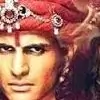Folks,
This one is being written under difficult circumstances, as I am in a lot of pain. In fact, I was in some doubt as to whether I could get it out at all, even a day late. So if it is not up to par, please bear with me!
Episode 49: Despair and doubt
This time, in a reversal of the situation for Episodes 46-48, it was the first episode that rated very little analysis. Amidst the fiasco of Motibai's trial in the Diwan-e-Khas and her being sentenced to a cruel but common punishment in those days, what stood out were two things.
Despair: One, Jodha's tenacity even in the midst of black despair and helplessness. She does not let go, but tries every avenue she can think of to save Moti. But as one by one, all those from whom she seeks support and help - Hamida Bano, Gulbadan Begum. Jijianga - turn her down citing their helplessness in the face of the Shahenshah's verdict, she is worn down by misery and a sense of guilt at not having been able to protect her sakhi. Paridhi brings out all this extremely well, and we are able to feel Jodha's grief and guilt alike.
The interesting thing is that while the proceedings in this episode should, hopefully, have brought it home to Jodha that when the chips are down, the only one who can be of any help to her is her husband, she makes no move, even in extremis, to appeal to him personally.
Doubt?: The other is what Jalal seems to feel about this case, which is, on the surface, an open and shut one (let us not go into the rank idiocy of Jalal, and Jodha too, failing to question how a man of that class could have written such a letter to Moti! That is a plot hole big enough to have a truck driven thru it😡).
He appears to be disturbed about something that he feels is wrong about the case against Motibai. It is similar to the Malwa case, where he was sure in his own mind of Adham Khan's guilt, but was unable to prove it and thus had to let him off. This time, not knowing Motibai, he is not so sure, but still he is not comfortable with it . It is because of this sense of unease that he goes personally to meet Motibai in the prison and tries to get at the truth, promising to let her off lightly if she was lying about Adham's involvement, thus minimizing her punishment even if Adham was shown to be in Mathura. But her talk of hoping that he does not commit an injustice puts his back up in an instant. The Amer women seem to have a positive talent for being undiplomatic!
As for the question of whether Jalal pronounces the death sentence on Moti in order to force Jodha to use his farman to save her life, I simply do not know, and your guess is as good as mine. But on the balance, I would think not.
Scene of the Day: Mahaam Anga's chillingly sadistic account of the likely manner of Motibai's death behind the wall. It made my skin crawl. She plays Jodha, who should have sent her packing after the first sentence, like a violin. But why the devil is Jodha so lost to all sense of self-respect that she actually asks that old witch why she is giving her, Jodha, itni peedha? The only possible answer is that she is by now emotionally so down and out that she does not react normally.
And why on earth do Jodha's daasis scuttle out as soon as Maham orders them away? They should hve awaited a confirmation of this order from their mistress😡. It seems to be a case of like mistress, like maid.
So on to Episode 50.
Episode 50: Duel of wills
There were in fact 2 duels here between Jodha and Jalal , and both were as much of the minds and the wills of the contestants as of their swords. Between them, they bookended an episode which had little else of note. Let us first dispose of the odds and ends.
Maham: Viciousness unbounded: The ugly tirade against Jodha, and to her face, by a shellshocked Maham Anga, fuelled by both escalating fear and by jealousy, was unbelievably vicious. I could not believe that this woman would have the gall to address a Shahi Begum in such terms, to mock and deride her so harshly. It must be a corollary of her assumption that Jodha has no hold on Jalal at all but the pull of the unattained, and that this too will soon pass, and then there is the visceral hatred she feels for all Hindus - witness how she recoils in distaste when Motibai touches her.
So far, Maham Anga's negativity towards Jodha has been oblique, and she maintained the surface proprieties, even if halfheartedly. But this time, the gloves were well and truly off, and all the bile in her for Jodha came pouring out in one vile stream of abuse.
What I could not digest was Jodha's standing there and listening to the harridan go on and on and on spouting venom, when all she had to do was to order her out in one sharp sentence. Maham Anga cannot enter Jodha's quarters uninvited and at will, and Jodha should have made that clear at once. It was bad enough that Jodha's daasis scurried out the day before when Maham ordered them out, without getting any confirmation from their mistress. If she had tried to pull any such stunt with Ruqaiya, she would have been told off in no uncertain terms.
This time, I was startled and dismayed to see Jodha getting up to greet the old witch. What for? Ruqaiya never does so, and Jodha is as much of a Begum as Ruqaiya is. She should have got the upper hand right at the beginning by staying seated, and then sending Maham packing after the first 2 sentences.
Jodha did raise my hopes when, after returning her zeher ki kuppi, she told Maham with queenly disdain: Rahi baat Shahenshah ke aadesh patra ki, to unke farman se bada unka vachan hota hai, jo humein mila hai... To ek baat yaad rakhiye, aadesh patra ki aavashyakta daason ko hoti hai, Raniyon ko nahin, thus flicking the ex-daasi Maham in the raw. But that was it, and then she let Maham run riot about Jodha being a naya joda for Jalal, soon to become purana, when she, Maham, would show Jodha ki harem mein aapki asli jagah kya hai.
Jodha's comment about the lack of maan aur aadar for their own sex in both Maham and the women of the harem was very well taken, but it was hardly the response needed in the face of Maham's bile. She should have booted the old witch out unceremoniously long before she got to this stage.
As Ela once noted, Jodha seems to reserve her pride and her snubs only for her patidev. I felt like shaking her, to try and drill some real shahi guroor into her head😡.
NB: It is more than likely that it is this malicious and wounding assertion by Maham - that Jodha, once Jalal had possessed her physically, would soon be jettisoned by him - that (even more than a similar statement from Ruqaiya) lies at the root of the highly irritating, and at times highly unseemly, emphasis laid by Jodha on not letting Jalal come anywhere near up close and romantic with her. She cannot stand the idea, and the humiliation, of being treated like a commodity, and this fear, including fear of her own reaction to the closeness of her handsome husband, lingers long after her relationship with Jalal has been transformed beyond recognition.
Well, this is not an entirely satisfactory explanation for Jodha's standoffishness, and her very odd, and even ugly behaviour with Jalal, and for a long, long time, but this is the best that I can do!
Ruqaiya: mindless plasticity: The other faltu scene was of Ruqaiya at the harem. There should be a Defend Ruqaiya Forum to agitate against the wanton degradation of the character of Akbar's Empress-in-chief, now reduced to a shallow, harem-obsessed, mindless female. Smilie must be glad she was replaced before having to play this plastic creature. If Jalal could survive 100 days, not to speak of 100 nights with this female, he deserves a medal as big as a soup plate!😉
Now on to the real masala.
The farman: I was disappointed at the rather pedestrian denouement of l'affaire farman. I had half hoped for a Mughal-e-Azam style rescue for Motibai, but pinned my hopes on Jalal finding out on his own that the dead man had nothing to do with Motibai, even if the Adham angle was still left open. Well, this is not the last time the CVs have tripped me up and it will not be the last, I guess!
But the scene itself was remarkable, and this as much for what was said as what was not said.
To begin with, once Jodha has, thanks to Rahim, remembered the talisman of the Shahi farman, she bulldozes her way into the Diwan-e-Khas with characteristic bluntness. But this is a life or death situation, and she could hardly stand on niceties!
She wants to make her request as something due to her by right, not an act of grace on the part of the Shahenshah. So, when Jalal tells her that his decision is final, she puts her chin up and echoes his words: Apne diye hue vachan se peeche hathna Shahenshah ko shoba deta bhi nahin! As she produces the farman, she stresses that it is his written promise, and humein Motibai ka jeevan chahiye.
Jalal looks at her, his eyes level and inscrutable, though inside, he must have been chortling Ab aaya oont pahad ke neeche! He gets up, takes the farman, his face unchanged as he opens it and scrutinizes it.Then he looks across at Jodha.
Just then, for a fleeting instant, there is a look of triumph in her eyes, triumph at having forced him to change his verdict and spare Motibai. Jalal notes this, and it is surely because of that look that he tears up the farman and throws it away. He wants to see that look on her face replaced by sudden fear and dismay, if only for a little while. The angry gesture comes from the accumulated anger of their last encounter, when he went personally to make her accept the farman, and perhaps he also wants to give her a little fright, and why not?
As Jalal walks away, in reality to free Moti though Jodha does not know that, she holds him back by clutching his arm. His sharp look, as he turns back to her now fearful and pleading face, and gazes down at her hand on his sleeve, speaks volumes, about her and about him, but there is no easing of the tension he has deliberately created.
Slowly, Jodha's hold slackens and she takes her hand away. Now it is Jalal who abruptly pulls her back to him - she stands stock still, averting her face but not wrenching herself away - and whispers right next to her ear that there is nothing greater than a Shahenshah's word.
The gesture, and his smile, are not really flirtatious; there is more of satisfaction that she has been forced to eat her earlier words : Humein jo nahin chahiye wo hum nahin lete.. Is sansaar mein aisa kuch hai hi nahin jo aap humein de sakte hain.
As he lets her go, turns on his heel and leaves, Jodha is left looking after him, half hopefully, half still worried. Worry that is to be dispelled very soon.
It is true that like the wishful thinking I and many others were indulging in re: Jalal - that he was so keen to get Moti off so as to spare Jodha the lifelong trauma of her death, that he would have exerted himself to dig out the truth - fell flat on its face. But I feel that this makes the script that much more realistic. Let me explain why.
Jalal is, above all, the Shahenshah, and now, without his Khan Baba, he has many serious and pressing political issues concerning the Mughal empire to tackle. The suspected rebellion by Mirza Hakim in Kabul and Kandahar that he is discussing when Jodha barges in, which has to be dealt with quickly and quietly, is merely a case in point. Earlier, during Bharmal's visit, there was a report about trouble in Jaunpur and elsewhere. There is also something amiss in Mathura. These are the matters that should and do preoccupy him; his personal affairs have to come second, and they do.
So, it was perhaps unduly wishful and unrealistic of us to imagine the Shahenshah burning the midnight oil trying to find ways to save a wench who he now believes has been lying thru her teeth to disastrous effect. And this for another female who is blatantly hostile to him and who, he might feel, would dismiss even any such efforts he might make as a fraud. It is far more plausible for him to behave as he does; letting Moti go to her death, since he is now convinced that she is guilty. He has already gone out of his way by visiting her twice in prison, an unprecedented gesture from an emperor, and that is it.
This is also for the better, in another way, for the Jalal-Jodha love story. This can now develop free of any improbably romantic twists, and also of the burden of gratitude on her side. I would like her to find out about Jalal's many positive qualities, over and above keeping his word, which she now acknowledges, and proclaims proudly to Maham Anga. But I would like her to do this in an impersonal context, unrelated to herself or her family, like what he did for that little Hindu boy. That would show her the real Jalal, who is that way by and of himself, because that is what he thinks is right, not something he cooks up or does to impress or please her. The admiration she will feel then is the only kind of admiration that will last.
NB: As for Jalal looking down at the farman, even though he cannot read it, that is for 2 reasons:
Firstly, because even if he cannot read it, he can recognise his seal, and this make sure that it is indeed his.Secondly, perhaps also because he does not as yet feel up to letting Jodha know that he cannot read or write. That has always been a sore point with him; remember his bitter reference to himself as an anpadh jaahil, in the last conversation between the roohs of Jodha and Jalal?
Ela, I hope you are not disappointed!
The Fencing Bout: Yes, yes, it was mindblowing, terrific, out of the world, rocking, and whatever else any of you wants. .
But, the fact remains, as a young friend had pointed out in my 2013 thread on this episode, that the context was totally unconvincing. It was as if the CVs has decided that the fencing match had to be copied from the film, and that this episode was the one to shove it in, and so they shoved it in willy nilly, and plausibility be damned.
So we had Jodha, who had apparently thoughtfully carted her sword and the white fencing attire to Agra, suddenly get up one fine morning and decide to shed her ultra heavy daily Christmas tree getup for the aforesaid whites, and do a spot of fencing practice right next to the Shahenshah's quarters. Why the face veil, then, when the bindi is a dead giveaway? In fact, she could easily have been challenged, or even attacked, by some watchful guard, who would rightly have taken her for an armed intruder. The whole thing looked like a hastily assembled patchwork, quite unlike in the film, where the context had been worked out perfectly.
But the scene itself was pure delight from beginning to end. As Jalal, having dismissed a request for an audience from one of his begums, strolls out for his jungi riyaaz ( where are the others, usually a whole bunch of soldiers, who are normally part of this exercise? Why, they have not turned up because this is to be a solo encounter with Jodha!😉), and hears the repeated swish of the sword, his face is a study: first curiosity, head on one side like a bird, and then, as he spots Jodha, there is a half smile of pure amusement and surprise. And while Jodha stands still when she sights him, and lowers her sword, it is Jalal who initiates the fencing bout.
The duel itself was wonderfully choreographed and superbly executed by both the actors. Paridhi in particular seemed to have put her training in fencing to good use, and matched the more experienced Rajat every step of the way. Jodha must be physically very strong for a relatively small made woman if she can push the much heavier Jalal back so hard, even allowing for the surprise element!
The duel in the film was more lighthearted and flirtatious, for there was no such backlog of deep animosity between them there. Whereas here it is an extension of their daily bouts of angry one-upmanship - Jodha's acerbic Baatein durbar mein hoti hain, Shahenshah, yudh mein vaar par dhyan dijiye!, making it clear that for her at least it is open war. Indeed, it seems at times as if she would really like to land him a deadly blow!
One can of course read anything one wants into their eyes, especially hers, in that long moment when they stare at each other from 6 inches away (kudos to the actors who manage that without going cross-eyed, and still maintain their respective expressions👏).
Also into Jalal's words: Jung mein nazar chookna bewaqoofi hoti hai, par mauka chookna us se bhi badi bewaqoofi.. Chahti to aap kuch bhi maang sakti thin: hamara sar, aapki azaadi, harem ki shaan, duniya bhar ka aishoaaraam, kuch bhi...
My take is that rather than doing something as commonplace as flirting, Jalal is angling for an opening to the person he senses that she is, even while making a subtle, sensuous attempt to disorient her by his physical nearness. Jodha is trying equally hard not to give him that opening, and also to shut her senses to the closeness of this very attractive man, and whatever hitherto unknown sensations that stirs up.
Which is why she neither trips him up with a smart retort about the huge risks he had run to save another servitor, Abdul (Oh Abdul, where, oh where are you? You are sorely needed!) , nor does she let him prolong the near clinch, but sends him reeling with a smartly timed and very hard shove. And rounds things off by using his own shamsheer to hold him at sword point.
The expression in Jalal's eyes as he looks at her at the very end is most revealing: he looks frustrated but still curious, while she seems angry, mostly with herself. But why? Is it because she has sensed a weakness in herself for her handsome husband that she never knew existed?
So on to Episode 51
Episode 51: Pas de deux
It somehow seems entirely appropriate that the episode opening the second half century of the re-run of Jodha Akbar should be what can only be called a super-superlative treat. I would have preferred that marvellously apt term coined by Mary Poppins, but whenever I have tried to use it, the IF resident censor declares that I cannot post with such unknown words! But let me try once more. Supercali fragilistic expiallodocious!
Episode 51 was a layered delight - like the millefeuille beloved of Austrian patissiers, or even better, our own sohanpapdi. One took off layer after layer, as scene followed scene from the beginning to the end, and each was better than the last. It is meant for repeat watching, savouring known pleasures with fresh appreciation: I have already seen it 4 times and I need more.
Ah yes, the pas de deux of the title. As in the ballet, this too had the now forward now backward movements of the classical romantic dancing duet, except that here only we knew that it was all, if not quite romantic, decidedly pre-romantic.
Let us take the scenes in chronological order, thus avoiding the tricky task of grading them.
The Fencing Duel - Conclusion: The easiest way to ruin a lovely scene is to botch up the ending. Here, it was the opposite; the end was so beautifully and so delicately done - sassy, mischievous, and withal admirably candid - that it enhanced the appeal of the ferocious duel that had preceded it.
Thus Jodha, having sent Jalal reeling with a hard shove and collared his shamsheer: Aapka dhyan chook gaya, Shahenshah! Aapki anumati ho, to hum ise aapki moorkhata kehna chahenge. And as Jalal begins to move away, Nahin, nahin, hiliyega nahin! Ek bhool - and her eyes are alight with triumph - aur talwar aapke hriday ke paar!
The ubiquitous Jalal ka missing dil motif was there all right when Jalal refers to her having galat jagah par nishana lagaya, but only to provide a neat opening for Jodha to toss Jalal's shamsheer back to him with a couple of cheeky lines to accompany it:
Jiske par hriday na ho, wo jeevit nahin. Aur jo jeevit nahin, use maarkar hum kya karenge? And then, as he quips Aaj pehli baar kisi ne humein sheh di hai (not mat, be it noted!).. Aap wakayi mein ek behatareen sipahi hain, aur utni hi bewaqoof bhi.. Chahe to hamara qatl kar sakti thin, par humein chhod kar ja rahi hain.. ,
Kisi nihatte ko maarna veerta nahin! Her eyes are bright with the pride of victory as she adds Aur kisi ko maarne se koyi shaktishali nahin hi jaata hai!
She looked very handsome while saying all this, which must have softened their edge for Jalal, for he smiles without the least hint of resentment.
Exemplary loser: He shows how good a loser he is by acknowledging that she had got the better of him, something which not many men, not to speak of emperors, would have done.
He caps that by generously praising her as a behatareen sipahi, which is, to my mind and surely to Jodha's as well, a greater compliment than being called just a yoddha, for a soldier has to have not just technique, but concentration and discipline as well.
For those who are wondering why Jalal asks her, for the third time during the bout, why she had not killed him, it is because he is trying to get her to say that he is her pati and so she cannot, as a dutiful wife, bump him off. But Jodha does not oblige, and he is instead treated to a reiteration of the Rajput code of honour, plus a put down of the practice of killing others as a way of showing off ones own prowess.
Jalal, unfazed, listens to this little homily with a slight smile, and as he turns to leave, he delivers his coup de grace. When he says Aaj pehli baaar hamari shamsheer ne humein dhoka diya hai, par isme uska qasoor nahin, Jodha fully expects him to add that it was because of her fencing skills, and she puts her little chin up in anticipation.
Kasoor aapki khubsoorati ka hai : Jalal, however, is the master of the unexpected. Kasoor aapki khubsoorati ka hai... he tells Jodha, and this is said with no emphasis, no change of tone, just as a simple fact. And he turns away and leaves, without a backward glance.
Not quite, perhaps, for maybe he did look back from farther away.He would have been pleased with what he saw, for Jodha is standing absolutely still, with the oddest expression of muted satisfaction on her face, like someone rolling a delicious but unfamiliar sweet on her tongue and savouring it to the full.
Ruqaiya flubs it: I was moved to pity on seeing what a mess the supposedly astute Ruqaiya was making of the latest Jalal-Jodha contretemps. As comic relief, it was, right from her unavailing struggle to unsheath the shamsheer, very good. But it was also a sad display of unbelievable incompetence, and ignorance of the male psyche.
To my fellow Austenites, did it not remind you of the equally hilarious exchanges, in Pride and Prejudice, between Miss Caroline Bingley and Mr. Darcy, at Netherfield, when Elizabeth arrives, all muddied after walking across the fields, to visit the sick Jane?
Ruqaiya should have praised Jodha's martial skills to the skies, thus making herself look good in Jalal's eyes, while simultaneously hinting, very discreetly, that fencing was not quite ladylike or appropriate for Shahi Begums. Instead, she produces a litany of negative comments about Jodha - including about Jodha's nafrat for Jalal - which makes him narrow his eyes - as contrasted with her own mohabbat.
Every one of which is not only immediately countered by Jalal, but only results in his becoming even more fascinated by all the new fans that he is discovering in Jodha every time he, or rather Ruqaiya and he, in that order, try to humiliate her and fail.
Galat, (when she seeks to present his having disarmed Jodha as a revenge for Ruqaiya's defeat at chess). Haqeeqat to yeh hai ki jitni wo shatranj mein maahil hai, utni hi shamsheerbaazi mein bhi.. Zaleel to use karne ki koshish karte hain, par har bar ek nayi baat, ek naya fan jaan ne ko milta hai uske baare main.. Ne jaane kya kya aur jaan na hai uske baare mein..
And when Ruqaiya claims that is harem main aane e pehle hi Jodha ki shikast ho chuki hai, Jalal retorts: Aaj tak hum bhi uske baare mein yahi galatfahmi rakhte the. Dil ka to pata nahin, par apne dimaag ka istemaal bakhoobi karna jaanti hai wo..
Humein uske guroor ko todna hai, jise ab tak humne toda nahin hai.. Uski shikast to hui hai, par hamari fateh muqammal nahin hui hai.. Ab bas yeh dekhna hai ki dil jeet ta hai ya dimaag. As I listened to his last line, I had the feeling that he was referring as much to himself as to Jodha!
If any woman of average intelligence had a husband who openly wondered about what else he would discover next in another woman, all the red signals would be flashing and all the alarm bells ringing in her head. Not so for Ruqaiya, who still boasts smugly of ruling the harem thru her dimaag! Even there, Jalal has fresh praise for Jodha's dimaag, and one should, by rights, have heard Ruqaiyas teeth gnashing in impotent rage. No such thing happens, which was when I gave Begum Ruqaiya Sultan up as a lost case.
And Jalal continues on the path he had taken during the fencing bout, of trying to make out what makes Jodha tick - her dil or her dimaag - what she is all about, and what more unexpected discoveries about her lie in store for him. He too is well on the way to becoming a lost case, though of quite a different kind!😉
Joke of the day: Ruqaiya clinging to Jalal's arm and praising him for having got the better of Jodha in that fencing bout. Here is perhaps the premier swordsman of his day, who keeps himself in top fighting mettle, and he is to be felicitated on having disarmed a young woman? It is Jodha who deserves a medal for having stood up to him and almost got the better of him at one point.
The CVs seem hellbent on making Ruqaiya out to be even more of a featherheaded, fawning bimbo than she has already been reduced to. One of these days, the real Ruqaiya's shade will rise from her maqbara , and then in logon ki to khair nahin!!😉
The Rescue of Rahim: I loved it when Jalal, reacting unthinkingly and censoriously, like a Victorian schoolmaster, was called to order bluntly by an angry Jodha. Kitna uttam nyay hai na aapka, Shahenshah? Aapne aapki Badiammi ki baat to sun li, ki hum aur Rahim talaab mein the, parantu kyon, kis liye, kaise, yeh prashna na to aapke man mein aay na aapki Badiammi ke! ... Then, in a smart swipe at his lecturing her about Mughal tehzeeb, Aapki drihsti mein ek doobte hue bachche ko bachane ke liye paani mein koodna Mughal maryada ka ullanghan ho sakta hai, par hamari drishti min wo hamara kartavya tha!
While the most satisfying part of this whole affair was Maham Anga falling, yet again, flat on her face, she did make a quick recover with Jalal, apologizing to excess for her latest bout of anti-Jodha nastiness, which she predictably passed off as an unthinking fit of rigid adherence by her to the norms of Mughal tehzeeb.
I was glad to see that Jodha, far from being taken in by this sophistry, was looking daggers at aapki Badiammi ( I loved the savage emphasis on the aapki !). I was even more pleased to see that when Jalal, after recovering from the shock of what had nearly happened to little Rahim, begins to explain his initial reaction, and gets to the stage of praising her for saving the child's life, Jodha, who has been looking daggers at him as well, cuts him off before he reaches the apology stage - Hum ab yahan se jaana chahenge Shahenshah! Hamari baat sunne ke liye dhanyavad! - and walks off in an obvious huff.
Attagirl! I said to myself, that is the stuff to give him and his Badiammi! 👏
The initial part of this segment, between Jodha and the bansuri chor Rahim, is very sweet and endearing. One hopes that Jodhas Kanha got his bansuri back; it should not have been too difficult to recover it from that still water body.
Hamari Chotiammijaan: This one too is a delight, if in a different way. Jalals unaffected affection for and indulgence towards little Rahim, and his readiness to halt the proceedings of the Diwan-e-Khas till he sorts out the child's problem, are utterly charming and, more important, revealing of the inner man behind the Shahenshah.
They form a counterpoint to the silken smoothness, that of an iron fist in a velvet glove, with which the Shahenshah deals with what he knows will be a recalcitrant Sharifuddin, commanded to disgorge all the ransom he had extracted, after the defeat of Amer, from the hapless Bharmal. Jalal's Hamein ummeed hai ki hamare hukum ki tameel hogi is not an ummeed at all, but a veiled warning, and Sharifuddin, after an instant when his eyes are red with baffled rage, falls in line at once and promises full compliance with his orders.
He even schools his countenance to an indulgent smile as he watches Jalal play with Rahim. But as Shakespeare would have said, Jalal has to beware of one who smiles and smiles again, while harbouring black villainy in his heart.
That Sharifuddin would once again take his suppressed rage towards Jalal out on his sweet, fluffy wife was predictable, but not that he would go so far as to hit her. It was an ugly little scene that soured the taste of the episode, but only a teeny bit. Incidentally, is there some unwritten rule that such despicable husbands should have such sweet and compliant wives? It seems to hold for both Adham and Sharifuddin.
To revert, the best line in this segment is the very last one, as Jalal, ruminating over Rahim's new Chotiammijaan-cum- nayi dost, easily identified as Jodha, says to himself, without even a hint of mischief, Rahim ko waqt dena hi padega. I was in stitches every time I rewatched it, saying to myself Young man, you are in the suds now, good and proper! You are not even going to know what hit you !
Hamari Begum ka Dupatta: This was really the piece de resistance of the whole episode. A scene full of newly soft sentiments barely hinted at but still clearly there, of all the traditional panoply of courtship, and this on both sides, ending with a revelation that is bound to ease the path to the future for this Odd Couple. It was like a perfectly done souffle, light as air and as insubstantial, but for all that, a melting delight for the tastebuds.
To begin with, Jodha is actually waiting for Jalal to come to see her and, presumably, complete the apology that he owes her for the Rahim fiasco of the morning. Which is why, when she is on the way to her rooms (and here, the manner in which she gracefully acknowledges salutations from right and left, as she continues on her way, hints at a new found ease in her surroundings ) and the Shahenshah's arrival is announced, she pauses and looks back for a long moment, setting off again only just before he appears in the distance.
She then positions herself at a window, with her back to the room, a stance carefully calculated to convey her total indifference to the imperial visit that she is sure will materialise😉.
When she senses Jalal in the room, she tries to look back out of the corner of her eyes without making it obvious.
The field of vision is not right, and so, when her dupatta is tugged at, she assumes that it is Jalal. Her expostulation is a classic in its own way -Shahenshah, hamara dupatta chhodiye! Aapne kaha tha ki aap kuch... phir kyon aap aise...
The remonstrance is so patently fake, with its reference, not to her dislike, but to his having said that he would never come near her. Jalal, a good 6 feet away, must have been chortling in suppressed glee as she turns around! 😉
Her reaction to Jalal's mischievous comments to her, via Rahim -Tum bade hokar mere jaise hi banoge (I asked myself at this point: Kisme? Dupatta kheenchne mein?😉) - accompanied by a sidelong look up at Jodha, then Agar tum chote na hote, to hamare Begum ka dupatta kheenchne ki gustakhi ki sazaa milti, with another upward glance - show no anger or even distaste. On the contrary, there is a sort of hesitant shyness in the way she looks very briefly at the duo on the floor, and when Jalal picks Rahim up and leaves, there is a hint of disappointment that he did not say anything to her. For any normal couple, these would have been insignificant signs, but for our Kate and Petruchio, they are nothing short of revolutionary!
Finally, while Jodha is still mulling over what has happened, the conversation between two other begums reveals to her that Jalal loves children as a whole, and not just Rahim (who she still thinks is his son).
It is said that the British can forgive much to a man who loves dogs. For Jodha, read children. The revelation that the kroor Shahenshah actually loves kids is the first breach in the wall of hostility towards him with which she has surrounded herself. It will be very interesting to watch this breach being widened as new revelations about Jalal surface, till one day, it brings down the whole wall.
Well, folks, this is it for today, and I am sure you all feel relieved!😉 I have written this post sitting in bed so as not to put any pressure on my bad knee, but as I do not have Wi-fi, I cannot respond to your comments the same way. So my advance excuses if I cannot manage it.But I am sure you will all have a lot of fun even without me!
Shyamala/Aunty/Akka/Di








































375